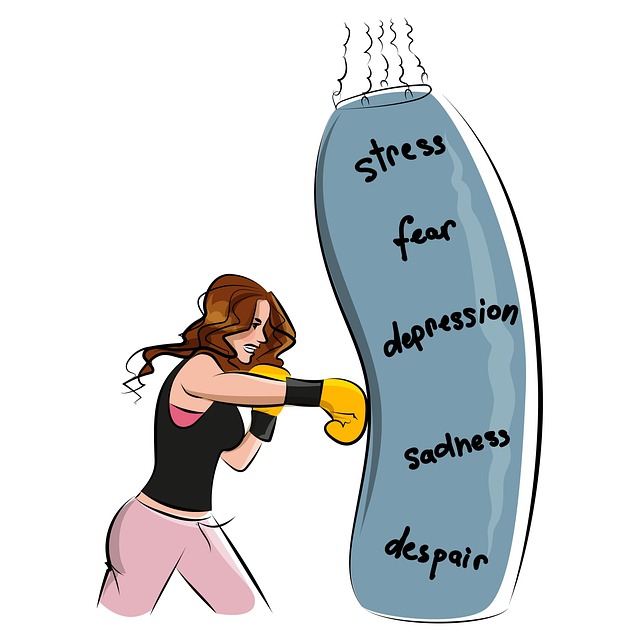Burnout among healthcare providers is a growing concern exacerbated by stress and heavy patient loads. Broomfield Exposure and Response Prevention Therapy (BERP), a cognitive behavioral therapy, offers an effective solution by helping professionals gradually expose themselves to stressors using mindfulness and mental health awareness strategies. Organizations can prevent burnout through supportive work environments, self-care promotion, and team-building initiatives, such as mental wellness podcasts and cultural competency training, ultimately fostering healthier, more motivated healthcare teams.
Healthcare provider burnout is a growing concern, impacting not just individuals but the entire healthcare system. This article explores comprehensive strategies to prevent burnout among healthcare professionals. We delve into the root causes, introducing innovative approaches like Broomfield Exposure and Response Prevention Therapy. Additionally, we discuss creating supportive work environments, promoting self-care practices, and building resilient teams to foster a sustainable and healthy healthcare workforce.
- Understanding Burnout Among Healthcare Providers
- Broomfield Exposure and Response Prevention Therapy: A Novel Approach
- Creating a Supportive Work Environment
- Promoting Self-Care Practices for Long-Term Sustainability
- Building Resilient Teams: A Collective Effort in Burnout Prevention
Understanding Burnout Among Healthcare Providers

Burnout among healthcare providers is a growing concern, with high-stress work environments and heavy patient loads contributing to significant mental health challenges. It’s essential to recognize that burnout isn’t simply fatigue; it’s a complex psychological response characterized by emotional exhaustion, depersonalization, and reduced personal accomplishment. This state can lead to decreased job satisfaction, increased cynicism, and even physical health issues if left unaddressed. Healthcare professionals often face the double burden of managing their patients’ well-being while also prioritizing their own mental health, which can be particularly challenging in demanding settings.
One effective strategy gaining traction is Broomfield Exposure and Response Prevention Therapy (BEEP), a form of cognitive behavioral therapy that helps individuals confront and manage stress triggers. BEEP encourages providers to gradually expose themselves to stressful situations, applying mindfulness meditation techniques and mental health awareness strategies to regulate their responses. By embracing mind over matter principles, healthcare workers can develop resilience, enhance emotional coping mechanisms, and ultimately prevent burnout.
Broomfield Exposure and Response Prevention Therapy: A Novel Approach

Broomfield Exposure and Response Prevention Therapy (BERP) is a novel approach that combines elements of traditional exposure therapy with cognitive-behavioral techniques. This innovative method aims to help healthcare providers confront and manage their stress and burnout by gradually exposing them to stressful scenarios in a safe, controlled environment. Through BERP, professionals learn to respond differently to these triggers, preventing the typical emotional and physiological reactions associated with burnout.
By participating in this therapy, healthcare workers can enhance their resilience and mental wellness. The process involves personalized guidance on stress management techniques, such as mindfulness exercises, relaxation strategies, and effective communication skills. Additionally, social skills training is incorporated to improve interactions with patients and colleagues, fostering better support systems within the medical community. BERP also encourages maintaining a mental wellness journal to track progress, reflect on experiences, and identify areas for further development—a valuable tool in promoting self-care alongside professional growth.
Creating a Supportive Work Environment

Creating a supportive work environment is a pivotal burnout prevention strategy for healthcare providers. This involves fostering an atmosphere where professionals feel valued, respected, and empowered. Organizations can achieve this through various initiatives, such as regular team-building activities, open communication channels, and accessible mental health resources. Incorporating evidence-based practices like Broomfield Exposure and Response Prevention Therapy (ERP) can also play a significant role in stigma reduction efforts related to mental illness, thereby encouraging healthcare providers to prioritize their mental wellness.
Moreover, the implementation of Mental Wellness Podcast Series Production can serve as an engaging tool to educate staff on burnout prevention strategies, provide coping mechanisms, and share inspiring stories from fellow professionals. By addressing the unique challenges healthcare providers face and offering support systems within the workplace, organizations can significantly contribute to maintaining a healthy and motivated workforce.
Promoting Self-Care Practices for Long-Term Sustainability

Promoting self-care practices is a pivotal strategy in preventing burnout among healthcare providers. It involves fostering a sense of balance and well-being that extends beyond the immediate work environment. By encouraging regular exercise, adequate sleep, and healthy eating habits, healthcare professionals can better manage stress levels and maintain resilience over the long term. Incorporating mindfulness techniques, such as meditation or Broomfield Exposure and Response Prevention Therapy (ERP), also plays a significant role in enhancing mental health and reducing burnout risk.
The development of a robust self-care routine is essential for better mental health. This includes setting boundaries between work and personal life, engaging in hobbies and social activities outside of work, and seeking support from colleagues or professional networks. Additionally, healthcare providers should prioritize regular Risk Management Planning to mitigate potential risks and stress factors associated with their practice. Equally important is Healthcare Provider Cultural Competency Training, which not only broadens perspectives but also fosters a more inclusive and empathetic working environment, ultimately contributing to improved self-care and job satisfaction.
Building Resilient Teams: A Collective Effort in Burnout Prevention

Building resilient teams is a collective effort in burnout prevention for healthcare providers. This involves fostering an environment that prioritises mental wellness and encourages open communication. Strategies such as Mindfulness Meditation and Social Skills Training can help team members manage stress, improve coping mechanisms, and enhance their ability to provide quality care.
By implementing these practices, healthcare organizations can create a supportive ecosystem where professionals feel valued, heard, and equipped to handle the demands of their roles. This collective resilience not only prevents burnout but also contributes to a positive patient experience by ensuring that caregivers are emotionally available and mentally present in their interactions with patients.
Healthcare provider burnout is a pressing issue, but with comprehensive strategies, it can be effectively mitigated. By understanding the root causes of burnout, implementing innovative therapies like Broomfield Exposure and Response Prevention Therapy, fostering supportive work environments, encouraging self-care, and building resilient teams, we can create a sustainable ecosystem that protects and empowers our healthcare workforce. These strategies, when adopted collectively, hold the key to enhancing job satisfaction and preventing burnout among healthcare providers.














